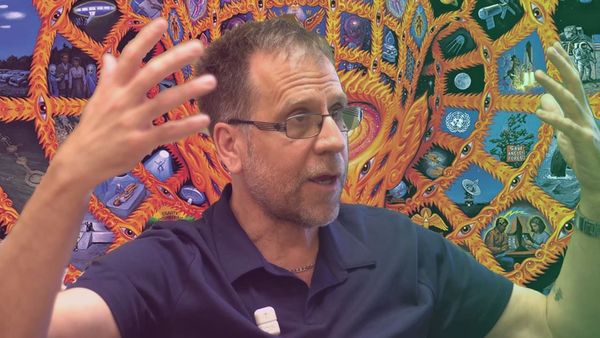Steve Taylor • • 9 min read
Acceptance is the Key That Unlocks Human Flourishing

“God, grant me the serenity to accept the things I cannot change, the courage to change the things I can, and wisdom to know the difference.”
— Reinhold Niebuhr, later adopted by Alcoholics’ Anonymous.
One morning in August 2000, I was sitting in my flat in Singapore, meditating, enjoying a state of inner calm. But suddenly, for no apparent reason, a loud, high-pitched ringing noise started up in my ear. It was as if someone had pressed a button inside my head. Everyone gets ringing in their ears sometimes, of course, so at first, I wasn’t concerned.
But this ringing didn’t go away.
And it seemed to get worse — after a few days, it got louder and developed an awful screeching overtone. I found it impossible to meditate, and difficult to sleep.
In fact, I was disturbed by the noise almost all the time. It was so loud that I was always conscious of it unless there was very loud background noise.
I gradually realized that the noise wasn’t going to leave me.
I realized that I had tinnitus.
Perhaps it was the result of playing loud music in rock bands for several years when I was younger, or perhaps it was related to an episode of bronchitis I’d had shortly before. The worst thing was that I could never escape the noise — it was always with me, 24 hours a day. I used to love silence, to just sit or lie down and listen to the stillness, so it was depressing to think that for me silence was gone forever. I went to see a specialist, who told me that I was partially deaf in my ear due to the tinnitus and that there was no chance of a cure — it was something I’d just have to get used to.
I tried to mask the noise — the specialist gave me a ‘white noise’ generating device to put in my ear, and at night I went to sleep with the radio tuned between stations. But that wasn’t fair on my wife – the noise of the radio made it difficult for her to sleep. Eventually, I said to myself, ‘This is ridiculous — the noise isn’t going to go away, so I’ll have to try to accept it.’
One night I decided to face up to the noise, and not switch the radio on. And to my surprise, it wasn’t so difficult. Imagine there’s a person who you think of as an enemy and are afraid to face — but once you do face them, you find that they’re not so objectionable after all. I managed to get to sleep quite easily, and the next night it was even easier. I found that I was less affected by the noise during the day as well. I even found I could meditate without background noise.
I still hear the tinnitus now — it’s screeching in my ear as I write this, but it doesn’t affect me. It’s just there, in a neutral, non-bothering way.
The Power of Acceptance
To me, this experience illustrates the amazing power of acceptance. An attitude of acceptance can neutralize unpleasant experiences — and even sometimes transform them into pleasant ones. I realized that the tinnitus was affecting me so negatively because I was resisting it.
As soon as I stopped resisting, it stopped affecting me.
I discovered a similar phenomenon when I wrote my book Out of the Darkness, which examines how difficult and traumatic events can sometimes have a positive transformational effect. Some of the people featured in the book underwent a transformation after being diagnosed with cancer, bereavement, losing everything through alcoholism, becoming disabled, suffering from severe depression, and so on. They found a new spiritual strength inside themselves, felt a new sense of connection to the world and to other people, a new sense of purpose and meaning.
I was curious about what distinguished these people from others — by far the majority — who don’t experience the transformational effects of turmoil and trauma. I found that the essential factor was acceptance. All of the people who underwent ‘transformation through suffering’ — as I called it — experienced a ‘moment of acceptance,’ when they gave up resisting their predicament.
They ‘let go’, or surrendered to their state.
In some cases, they felt they had no choice but to accept their state because they had nothing left to cling to or to hope for. This didn’t mean that they stopped trying to get better, or to rebuild their lives. It just meant that they faced up to the full reality of their state, and stopped trying to resist it in a rigid, adversarial way.
Some people experienced a transformation at the precise moment that they switched into a mode of acceptance. One participant in my research described how, as an alcoholic undergoing the AA recovery process, he experienced a transformation at the moment when he ‘handed over’ his problem. Another participant had become severely disabled and underwent a shift at the point when he heard a voice inside his head say, “Let go, man, let go. Look at how you’re holding on. What do you think life’s telling you?”
I reported several similar cases in my book The Leap, including a woman who went through a period of intense post-natal depression, entering into a psychotic state, which led to four nights without sleep. In the midst of this turmoil, she had an argument with her husband, which suddenly triggered what she described as “feelings of such perfect joy and peace. I remember thinking afterward ‘so that’s what I’m supposed to feel like!’ This experience was multidimensional…In a mystical consciousness, within that one instant, you sense forever and ever, and are forever changed.”
Once I became aware of the power of acceptance — following my experience with tinnitus — I began to use it in other situations.
I used it once when I was ill, lying in bed feeling miserable. I made a mental effort to shift my attitude from resistance to acceptance. I replaced thoughts like ‘I can’t afford to be ill, I’ve got deadlines to meet!’ with more positive thoughts such as ‘There’s nothing wrong with this situation – I’m lying in a warm and comfortable bed, relaxing. Everything that needs to be done can wait.’ I made a mental intention to embrace the situation, giving my full attention to my experience in the present moment.
Immediately my mental agitation and frustration began to fade away.
Everyday Acceptance
There are many experiences and activities in our lives which aren’t innately negative, and which could easily be neutralized — or even made pleasant — by the alchemical power of acceptance. Think of household chores, for example.
Are they innately boring activities, or is your antipathy towards them due to a ‘resistant’ mental attitude? Think about how you feel when you’re stuck in a long queue of cars at the traffic lights. What is the source of your frustration? You’re just sitting in the front seat of your car; you could be listening to some pleasant music or staring curiously at the other people in their cars, or at the streets, buildings or the sky. It’s only your mental resistance to the situation — your impatience and eagerness to reach your destination — which makes it unpleasant.
Our lives are full of neutral situations that are made pleasant or unpleasant by our mental attitude and our thoughts.
At the same time, it’s important to be aware that there are some things we should never accept — abuse, oppression, situations or role to which we’re innately unsuited, and so forth. It’s essential to differentiate the situations which we should try to accept from those which we should try to change.
For example, if you’re being bullied by your manager at work, it would be wrong to accept the situation — you should try to change it, by taking action against the manager, or by getting a new job.
If you’re living in an area of high crime and violence, acceptance may help to some degree, but it’s probably still advisable to move out if you can.
There are some occasions when it’s appropriate to change our mental attitude, and other occasions when it’s more appropriate to change our life-situation.
This has never been put better than in the ‘Serenity Prayer’, created by the theologian Reinhold Niebuhr, and later adopted by Alcoholics’ Anonymous: ‘God, grant me the serenity to accept the things I cannot change, the courage to change the things I can, and wisdom to know the difference.’
At the same time, I would say that acceptance is the first stage in the process of making necessary changes to our lives.
In order to change a negative aspect in your life, you first have to accept it as a part of your life.
You have to acknowledge it as a reality, face up to it, and open yourself to it. And only then will you be ready to do what needs to be done.
The Process of Acceptance
There are four areas of life where we need to practice acceptance. The first is pain and discomfort, as in my example of tinnitus.
This is difficult because our instinct is to shirk away from pain – to suppress it, or divert our attention from it. But research in mindfulness has shown that bringing your attention towards the source of your pain, and paying attention to the sensation of pain, can actually be beneficial. If you move towards the source of your pain and merge your attention with it, you may find that your pain becomes less severe, softer and number, more like a neutral sensation than pain.
The second area where we need to practice acceptance is in the everyday activities of our lives, particularly our chores.
Our habitual of resistance to everyday tasks and chores makes us think of them as boring and mundane so that we don’t pay real attention to them. But if we embrace them with an attitude of acceptance, they become more interesting and enjoyable. In many cases, we have no choice but to do the activities, so it makes sense to accept rather than resist them.
Thirdly, we need to practice acceptance in terms of our life-situations.
You might ordinarily feel like you’re not where you want to be, in terms of your career, your success or status, your relationships or your immediate environment. As a result, you might feel dissatisfied and frustrated. As mentioned above, to accept your life situation doesn’t mean that you shouldn’t try to change it. But acceptance is the prerequisite of change. Even as you feel that aspects of your life-situation are negative, you can still accept them.
Finally, we need to practice acceptance in terms of some basic aspects of the human condition, such as aging and death.
So many of us resist the aging process, unable to face the loss of our youth and our changing appearance. So many of us resist the reality of death, unable to face the idea of our extinction and the loss of everything we know and everything we have. But an attitude of acceptance to death can be transformational, and fundamentally change our values and our perspective.
I have formulated a four-stage process of acceptance, based on my own experiences, which applies to all four of these areas. It’s a simple method you can use in any situation where you feel negativity and are aware of an attitude of resistance. It works especially well with physical problems, and other seemingly unpleasant situations which produce mental discomfort.
I’ll go through the stages here, with examples — a fairly trivial one and a very serious one.
The Process of Acceptance
Stage 1:
Become aware of your negative feelings and the thoughts which accompany them. It may help to verbalize these — if the situation allows it, write them down.
For example, let’s say you’re driving and stuck in heavy traffic. You might verbalize the feelings “impatience, boredom, anxiety.” You might verbalize the thoughts, “I could be here forever! I’m going to be so late! There are so many places I’d rather be than here!”
Or at the other end of the spectrum of significance let’s take the example of death. When you find yourself contemplating death, and feel uneasy, with some existential angst, perhaps you can verbalize these feelings as “I don’t want to be apart from my loved ones! Or I feel as though I still have so much to do!”
Stage 2:
Give your attention to the reality of your situation.
Be mindful of your feelings and your surroundings. For example, in the traffic jam, be aware of the sensation of your hands as they hold the steering wheel, and your feet on the pedals. Look around you, at the other drivers and cars.
Give your attention to the sky, to the buildings and trees at the side of the road. Or in the example of death, don’t divert your attention from the contemplation of death. Face the reality of death, and remain conscious of the angst you feel.
Stage 3:
Replace your negative thoughts with more rational ones. Ask yourself “What’s really wrong with this situation?”
For example, in the traffic jam, you might have the conscious thought: “What’s the problem? I’m sitting down. There are lots of interesting things to look at. It’s a beautiful day, and I’m listening to music on the car stereo. What does it matter if I’m late?”
Or in the example of death: “Death is inevitable. It’s part of the process of life. All life forms take form, grow, and decay. The idea of not dying would be absurd! And in any case, death may not be the end. It may be some kind of adventure, another kind of journey.”
Stage 4:
Make a mental intention to let go of your resistance. Visualize your resistance as a barrier between you and the situation.
Watch the barrier slowly dissolve away, becoming more and more insubstantial until it disappears. Then completely embrace the situation. Feel yourself merging with it, in complete acceptance.
If you follow this process, you’ll hopefully experience the alchemical power of acceptance, how it can transfer negative moods into positive—or at least neutral—ones.
In the second example, you’ll perhaps experience the powerful transformative effects of accepting death. At the very least, you’ll become powerfully aware that it’s not so much the events or situations in our lives that determine our mood, but our attitude towards them.
Steve Taylor PhD is a senior lecturer in psychology at Leeds Beckett University, and the author of several books on psychology and spirituality, including Out of the Darkness, and The Leap. Eckhart Tolle has described his work as “an important contribution to the shift in consciousness which is happening on our planet at present.” www.stevenmtaylor.com










